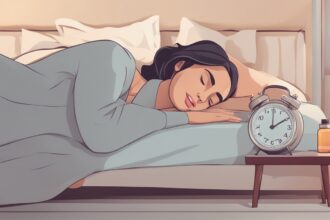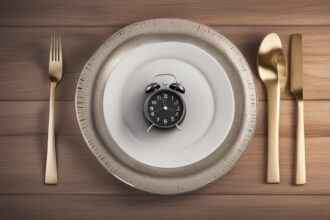Have you ever wondered how sleep and fasting are connected? If you’re into intermittent fasting or exploring ways to improve your health, you might be surprised to learn that the quality of your sleep can significantly influence your fasting journey—and vice versa. Fasting, a practice of abstaining from food for specific periods, has gained massive popularity for its benefits like weight loss, improved metabolism, and mental clarity. But without proper rest, those benefits might not shine through. In this post, we’ll dive deep into the fascinating relationship between fasting and sleep, backed by science, and share practical tips to help you balance both for optimal wellness. Let’s explore how these two pillars of health can work hand in hand!
The Science Behind Sleep and fasting
At first glance, sleep and fasting might seem unrelated—one’s about rest, the other about food restriction. However, they’re deeply intertwined through hormonal and metabolic processes. When you fast, your body undergoes changes in hormones like insulin, ghrelin (the hunger hormone), and leptin (the satiety hormone). These shifts can impact your circadian rhythm, the internal clock that regulates when you feel sleepy or awake. Research shows that fasting can influence melatonin production, the hormone responsible for signaling bedtime, potentially improving sleep quality over time. On the flip side, poor sleep can mess with your hunger hormones, making fasting feel like a grueling task as cravings spike. It’s a two-way street: better sleep supports successful fasting, and mindful fasting can enhance your rest.
How Fasting Affects Sleep Quality
Let’s break down how fasting impacts sleep. Intermittent fasting (IF), such as the 16:8 method where you fast for 16 hours and eat during an 8-hour window, can initially disrupt sleep if your body isn’t used to it. You might feel hungry at bedtime, leading to restlessness. However, studies suggest that once adapted, fasting can promote deeper sleep by reducing late-night blood sugar spikes and improving insulin sensitivity. Fasting also triggers autophagy, a cellular cleanup process, which some researchers believe supports brain health and may contribute to better rest. Timing matters, though—eating too close to bedtime during your eating window can cause digestive discomfort and hinder your ability to fall asleep. Aligning your fasting schedule with your natural sleep patterns is key to reaping the benefits.
How Sleep Influences Fasting Success
Now, let’s flip the coin and look at how sleep affects fasting. If you’ve ever tried fasting on just a few hours of rest, you know it’s a recipe for irritability and intense hunger pangs. Sleep deprivation increases ghrelin levels and decreases leptin, making you feel hungrier and less satisfied after meals. A 2011 study published in the journal Obesity found that insufficient sleep can sabotage weight loss efforts, even with calorie restriction or fasting. Lack of rest also raises cortisol, the stress hormone, which can lead to overeating or breaking your fast prematurely. Prioritizing good sleep isn’t just about feeling refreshed—it’s a critical strategy for sticking to your fasting goals and maintaining energy throughout the day.
Tips to Optimize Sleep While Fasting
Balancing sleep and fasting doesn’t have to be complicated. With a few tweaks to your routine, you can ensure that both work in harmony to boost your health. Here are some actionable tips to improve your sleep quality during fasting:
- Set a consistent sleep schedule: Go to bed and wake up at the same time daily to regulate your circadian rhythm, even on fasting days.
- Avoid late meals: Finish eating at least 2–3 hours before bedtime to prevent digestive issues that can disrupt sleep.
- Stay hydrated: Dehydration during fasting can cause headaches or fatigue, so sip water throughout the day to feel better and rest easier.
- Limit caffeine: If you’re fasting, avoid coffee or tea close to bedtime as it can interfere with falling asleep.
Strategies to Enhance Fasting with Better Sleep
Just as fasting can impact rest, optimizing your sleep can make fasting feel effortless. Here are some practical ways to use sleep as a tool to support your fasting journey and improve overall well-being:
- Aim for 7–9 hours of sleep: Adequate rest helps balance hunger hormones, reducing cravings during fasting windows.
- Create a calming bedtime routine: Wind down with activities like reading or meditation to lower stress and prepare for a successful fast the next day.
- Limit screen time: Blue light from phones or laptops can suppress melatonin, so avoid screens an hour before bed to improve sleep quality.
- Exercise early: Physical activity supports both fasting and sleep, but avoid intense workouts late in the evening as they can energize you instead of relaxing you.
- Track your patterns: Use a journal or app to monitor how sleep and fasting schedules affect your mood and energy, then adjust accordingly.
Common Challenges and How to Overcome Them
While combining sleep and fasting offers incredible benefits, it’s not always smooth sailing. One common issue is hunger keeping you awake during fasting windows. To tackle this, try sipping herbal tea or water to curb late-night cravings. Another challenge is feeling overly fatigued if your fasting schedule is too intense or if you’re not sleeping enough. Listen to your body—start with a gentler fasting approach like 12:12 if 16:8 feels draining. Stress can also creep in, disrupting both sleep and fasting discipline. Incorporate mindfulness practices like deep breathing to calm your mind. Remember, the goal of fasting and sleep optimization is to feel better, not to push yourself to the brink. Adjust as needed and be patient as your body adapts to these lifestyle changes.
In conclusion, the relationship between sleep and fasting is a powerful one that can transform your health when nurtured properly. Fasting can enhance sleep quality by regulating hormones and supporting metabolic health, while good sleep makes fasting more sustainable by curbing hunger and boosting willpower. By aligning your eating windows with your body’s natural rhythms, prioritizing rest, and following the tips shared above, you can create a synergy between these two practices. Whether you’re a seasoned faster or just starting out, remember that small, consistent changes in how you approach fasting and sleep can lead to big results. So, tonight, set yourself up for success—get that rest, plan your fasting window, and wake up ready to thrive!






